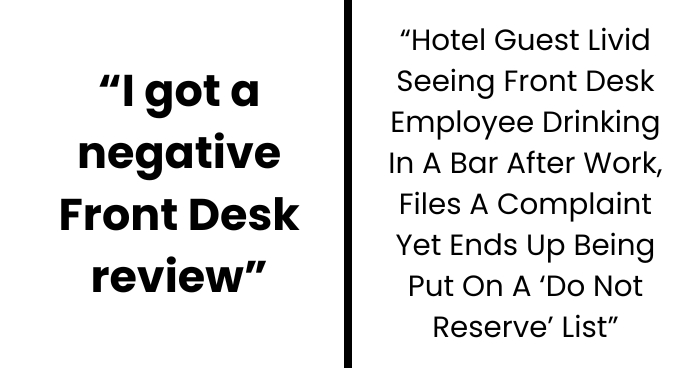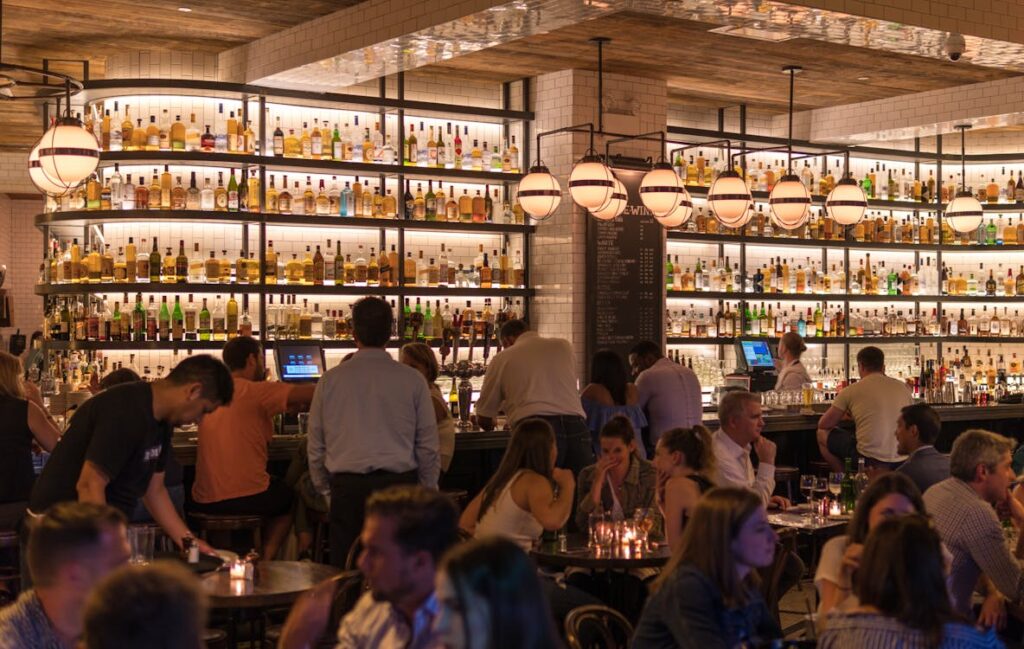Hotel Guest Livid Seeing Front Desk Employee Drinking In A Bar After Work, Files A Complaint Yet Ends Up Being Put On A ‘Do Not Reserve’ List
The story captures a fascinating account of an unfair customer complaint that could have easily spiraled out of control if not for a supportive boss and a rational approach. The author, a front desk agent with a spotless record over three years, recounts an incident that occurred while they were off the clock. After finishing a shift, the author went to a campus bar with friends, dressed in their work clothes (sans nametag or anything identifiable about their employer). A guest who had been checked in by the author recognized them at the bar and later left a scathing review, criticizing their choice to drink in public.
The complaint accused the author of behaving inappropriately by drinking and socializing while ostensibly representing the hotel, despite it being their personal time. The story highlights the boss’s professionalism in handling the situation: validating the author’s right to personal time, investigating the matter thoroughly, and ultimately removing the review. Moreover, the guest was placed on the Do Not Rent (DNR) list, signifying that their behavior was deemed excessive or rude. The boss’s camaraderie and support further underscore the positive resolution, as they even invited the author out for a drink afterward to celebrate putting the ordeal to rest.
Read for more info Reddit
The author of the post once decided to relax at the local bar after his shift at the hotel front desk







The manager, however, sided with the author, got in touch with the client and found out she thought front desk staff shouldn’t consume alcohol even off the clock











Professional Boundaries and Customer Expectations
This story raises important questions about the expectations placed on hospitality workers and the blurred lines between professional obligations and personal freedom. While the author was within their rights to enjoy their personal time, the guest’s complaint highlights a phenomenon known as occupational stereotyping—where certain professions are held to rigid, sometimes unreasonable, standards even outside the workplace.
Legal Precedents and Employment Rights
Legally, employers cannot dictate what employees do during their free time, provided their actions are lawful and do not directly harm the company’s reputation. In Gresham v. Safeway, Inc. (2010), the court ruled in favor of an employee dismissed for off-the-clock behavior, emphasizing that personal activities unrelated to work are protected unless explicitly tied to job performance. Similar cases affirm that employees maintain their autonomy outside working hours, barring contractual clauses or conduct policies that state otherwise.
In this case, the author took reasonable precautions to separate their personal activity from their professional identity, such as removing their nametag. However, the mere fact that they were recognized in work attire may have inadvertently linked their actions to their employer in the guest’s mind. While the guest’s perspective may stem from a desire for professionalism, it oversteps boundaries, holding the author to a perpetual code of conduct that is neither reasonable nor enforceable.
Related Case Studies
- The Case of Public Teachers on Social Media: Teachers often face public scrutiny for their personal lives posted on platforms like Instagram or Facebook. In one notable case, a teacher faced backlash for sharing vacation photos with alcohol in view. Though no policies were violated, the public perception led to community outrage.
- The Starbucks Employee Viral Incident (2018): A Starbucks barista was criticized for posting about attending a festival while in uniform. Starbucks clarified that the uniform implied no endorsement and supported the employee’s right to personal time.
These examples mirror the hotel guest’s unjustified assumptions in this story. They illustrate how misinterpretations of occupational boundaries can lead to unnecessary conflicts.
Hospitality Industry’s Perspective
Guests expect hospitality workers to embody professionalism and decorum, but these expectations must be tempered with fairness. Industry experts suggest educating employees and guests alike about what constitutes fair boundaries. Hotel management teams can also use such incidents to foster a culture of trust and mutual respect.
Reddit Comments







This story serves as a reminder that employees are people first, with rights to privacy and personal freedom. While the complaint could have jeopardized the author’s reputation, the boss’s understanding and decisive action reflect a commendable approach to conflict resolution. In industries where workers are frequently “the face” of their company, maintaining clear boundaries between professional and personal spheres is crucial. Ultimately, this incident underscores the importance of reasonable expectations and respectful dialogue in fostering positive workplace relationships.





